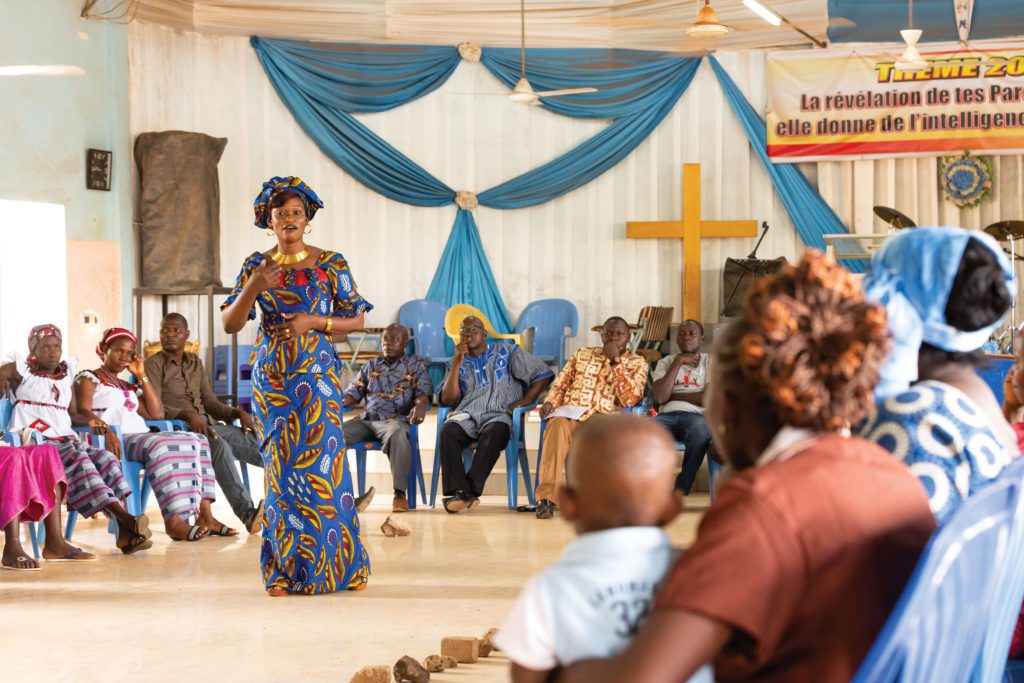Orality Is Just Good Missiology
by Ed Weaver
Of the estimated seven thousand extant languages in the world, less than one percent have well-developed written traditions.
Of the estimated seven thousand extant languages in the world, less than one percent have well-developed written traditions. The significant portion of the other ninety-nine percent rely heavily on spoken methods of communication such as stories, songs, poetry, and proverbs to learn and share information.
Orality is a term used as shorthand to describe one’s way of acquiring, processing and conveying information. In contrast to literate or print-oriented cultures, oral communicators rely heavily on spoken language.
While almost all of the unengaged and unreached people groups are oral communicators, a disproportionate amount of resources, methods, and missionary endeavors are geared towards literate cultures. The implications of these facts to missions are profound.
What does this mean to the Body of Christ as we seek to go and make disciples of all nations in obedience to the Great Commission? Do we have the tools to teach oral learners all that Christ has commanded his people to observe? Are we equipped to train and prepare them for the task of discipling others?
Effective communication is predicated on the message being heard and understood. It means understanding the receptor culture enough to know that literate methods will not truly touch the hearts of an oral culture. Just as Paul spoke to the philosophers in Athens in Acts 17 in a way they could relate, ministries working among oral learners must find a way to enter the world of oral learners to “become all things to all people…for the sake of the gospel” (1 Cor. 9:22).
Many have come to the realization that orality is just good missiology. Born out of our experience in reaching out to oral cultures in different parts of the world, the following seven insights have come to serve as our distinctives. Two are organizational; five are missiological.
Our Presuppositions
These seven core values are built on three presuppositions. In his work, Foolishness to the Greeks: the Gospel and Western Culture (1986), Lesslie Newbigin notes that there are three stages to communicating the gospel cross-culturally.
1. The communication has to be in the language of the receptor culture. It accepts, at least provisionally, the way of understanding things that is embodied in that language; merely translating word-for-word creates an unmeaning sound that cannot change anything.
2. However, if the communication is truly the communication of the gospel, it will call radically into question how any culture understands the world around them. If it is truly revelation, it will involve contradiction, and call for conversion, for a radical change, and a U-turn of the mind.
3. Finally, this radical conversion can never be the achievement of human persuasion, however eloquent it may be. It can only be the work of God.
Organizational Distinctives
#1. Local, indigenous partnerships are essential. The White Man’s Burden (2006), written by economist William Easterly, has profoundly shaped this first organizational distinctive. Easterly divides the development world into two schools of thought: planners and searchers. Planners believe one central plan will cure all development issues. One need only identify the right architects, the right plan, and enough money, and the plan will succeed.
On the other hand, searchers realize that there is no one single master plan that will solve all problems. The problems are too vast and the contexts too varied for a single solution. Searchers look for local solutions to local issues and seek to solve challenges with limited resources. Not all of the challenges can be solved, but one can take significant steps toward solutions with the right tools. Local accountability and feedback is one of these tools.
As an organization, we embrace the searcher method. We work with local partners toward local understanding and ownership of problems and solutions. Together, we strive toward culturally appropriate and sustainable leadership development. We pursue mutual understanding and feedback, not just from the four or five “top-level” national ministry leaders in a country, but from the people who work at a local, grassroots level.
Our programs are collaborative from beginning to end. We seek to foster an environment conducive for constant feedback and mutual accountability that are essential for the success of the project. Local, indigenous partnerships down to the local level are essential to our ministry. In this way, we can plow, sow, water, and harvest together to see God glorified by fruit that only he could deliver through his Universal Church.
#2. Third-party evaluation vs. self-reporting. Churches, foundations, and individuals who support missions and other non-profits view their giving as an investment. Phrases such as “return on investment” or “return on kingdom investment” indicate that donors think of their ministry giving in terms of return-on-investment.
Because they desire to be wise stewards, they look for maximum impact per dollar donated. This raises new questions during the planning phase of each program: What are the measurable results? What are the landmarks? What is the timeframe given to hit these landmarks? How will we know when we have arrived at our destination? The “outcome” is the summation of successful execution of action items. “Deliverables” are the expected
results of stages in a program.
In ministry, however, we must remind ourselves that kingdom objectives are spiritual first, and all results or outcomes are the work of God. We pray for wisdom in the creation of a work plan and the expected results of each phase, as well as the finished work and its impact on the culture. The work of God’s sovereign Spirit cannot be placed on our timetable or expected to deliver our “deliverables.”
While we do not control the outcomes, we hold that (1) working within a particular budget of time and resources and having third-party evaluation are consistent with kingdom values and (2) we have a measure of control over those aspects. Donors desire accountability and good stewardship.
Requiring third-party evaluation means we want someone from the outside analyzing each project we execute. Third-party evaluation helps us improve our ministry. Like an external audit, third-party evaluation lends objectivity to our ministry and its improvement. We are implementing the same kind of transparency and accountability we expect from our indigenous partners.
Missiological Distinctives
#3. Orality vs. audio. There is a distinction between an audio project and an orality project. Oral communicators employ songs, poetry, wisdom sayings, proverbs, stories, and dance structured in oral-friendly forms and styles.
A book in recorded audio is still fundamentally a literary work in its constructive logic and rhetorical style as the written document. We employ orality-friendly tools to construct our content to reach oral cultures in their learning style for lasting impact.
#4. Biblically faithful content that is indigenous. Instead of content conceived and developed elsewhere, we insist that our content development and production are as indigenous as possible. By producing the content locally, we believe that there is a better chance of interacting with the relevant worldview—foundational presuppositions that form a culture’s understanding and ultimately their interaction with the world around them.
In his important book, Honor and Shame (2001), Roland Muller argues that there are three major worldviews in operation around the globe: guilt/innocence, shame/honor, and power/weakness. The Bible articulates sin and salvation using all three motifs. This gives us freedom to present the gospel in a way that is worldview-specific so that the listener can grasp the transformational power of the life, death, and resurrection of Jesus Christ.
When we impose a Western worldview (i.e., the guilt/innocence framework), Christianity is dismissed as the “white man’s religion” and the perception flourishes that the gospel has nothing to say to Samburu herdsman, North Sudanese Arabs, or the Dalit. Presenting God’s truth in a manner that is worldview-specific puts the comfort and confrontation of the gospel clearly before the listener.
In each of our respective cultures, we often miss the things that make our culture/worldview unique. Sometimes, it takes an “outsider” to help us see the uniqueness of our culture compared to others. As we work with our partners, it often takes some initial work to have an effective dialogue that uncovers that uniqueness. With some coaching and shepherding, our indigenous partners quickly perceive how their cultures view and interact with the world. This understanding opens new doors of missiological engagement.
We work with our partners to ensure that the content is biblically faithful and specifically created for local contexts in order to best communicate the gospel. A framework of scriptural themes is used to guide the selection and production of content. The order in which those themes are presented or the way the themes are communicated may change based on a given culture to prayerfully create the greatest impact.
#5. Letting the Bible define the narrative. Orality theory and worldview studies combine to provide the primary vehicle in the process of crafting the appropriate content. All communication is worldview-specific. This includes God’s special revelation—the scriptures. While we strive to tailor our content to bridge and interact with receptor cultures’ worldviews, we also believe that the integrity of the narrative of God’s plan of redemption must be maintained. The story must be heard on its own terms, or we risk opening the door for a belief that falls short of a biblical standard of fidelity. We labor to present the truth in a manner that is both culturally relevant and biblically faithful.
Our basic program architecture calls for a set of biblical-theological content that has been tailored to directly address the receptor culture. The goal is to identify the “Bridges and Barriers” that each specific worldview poses and engage it with the claims of the gospel.
#6. Whole person ministry. In addition to biblical-theological themes, our contents include other life-saving and community development topics. The fall carried with it effects that are not exclusively spiritual in nature (Gen. 3). Increased pain in childbearing, strained relationships, a cursed earth, and frustration in one’s vocation are all a part of life in a fallen world. Jesus’ ministry reflected this reality. He restored sight to the blind, agility to the lame, hearing to the deaf, and life to the dead (see Luke 7:22), and his victory over death spreads into every aspect of life. Responding to the gospel means to “live justly, love mercy and walk humbly with their God” (Micah 6:8).
Historically speaking, holistic ministry is the norm for biblical Christianity. The Church at its best has always manifested this call to whole person ministry. The world and life view of the New Testament Church brought the Roman Empire out of barbarism, and the Church of Victorian England led the way in prison reform, the building of orphanages, and the ending of the slave trade.
#7. Promoting informed discussions among listeners. The strength of community within oral cultures is remarkable. We are asked, “How do you develop your listening groups?” Many times, the simplest answer is, “We don’t. In an oral culture, the listening groups already exist.”
Our content is introduced where daily life is already communal and information is shared and deliberated collectively. Real learning and transformation occurs in these discussions around this content. Once the conversation has been launched, a trusted and trained moderator facilitates, and when necessary, directs with some basic questions, while allowing the group to ask and answer their own additional questions.
Conclusion
These insights continue to inform our efforts to reach and make disciples of Jesus Christ among oral cultures in a culturally appropriate manner. All effective communication with oral learners must embody the traits and learning preferences unique to that society. A message not understood is a message not heard.
We believe God has called us to understand and reach oral culture people with the claims of Jesus Christ in a manner they can hear, understand, trust, and through which they can be transformed. Orality is just good missiology.
References
Easterly, William. 2006. The White Man’s Burden: Why the West’s Efforts to Aid the Rest Have Done So Much Ill and So Little Good. New York: Penguin Books.
Muller, Roland. 2001. Honor and Shame: Unlocking the Door. Bloomington, Ind.: Xlibris Corp.
Newbigin, Lesslie. 1986. Foolishness to the Greeks: The Gospel and Western Culture. Grand Rapids, Mich.: Wm. B. Eerdmans Publishing Co.
….
Ed Weaver is CEO of T4 Global, a ministry focused exclusively on oral cultures. He exited the business world in 2005, striving to meet the need of these cultures to hear the gospel. This article is a living document based on the works of teammates Kyle McClellan, Mark M. Overstreet, and Yohannes Faye.
EMQ, Vol. 51, No. 2 pp. 220-224. Copyright © 2015 Billy Graham Center for Evangelism. All rights reserved. Not to be reproduced or copied in any form without written permission from EMQ editors.



